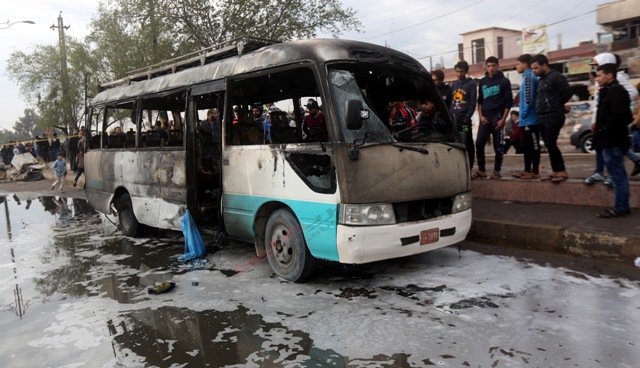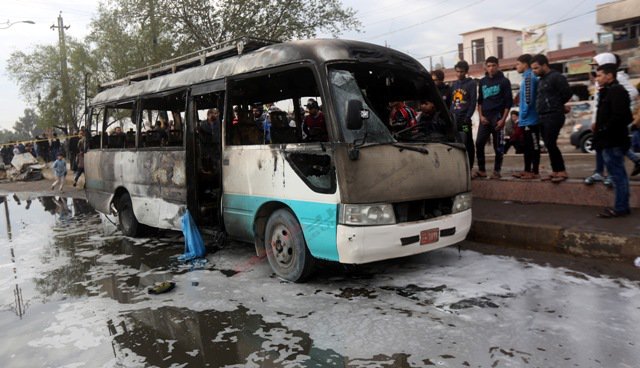As caliphate crumbles, Islamic State lashes out in Iraq

Aftermath of a car explosion in Baghdad’s al-Sadr city which was claimed by Islamic State 2

The Sunni jihadists have targeted Shi’ite Muslim civilians. Raids on police and army posts in other cities, also claimed by Islamic State, have accompanied the bombings.
The attacks show that even if Islamic State loses the Iraqi side of its self-styled caliphate, the threat from the group may not subside.
It will likely switch from ruling territory to pursuing insurgency tactics, seeking to reignite the sectarian tensions that fueled its rise, diplomats and security analysts say.
In addition to operations in and around Baghdad, IS has carried out attacks in the region and Europe as it has come under pressure in Syria and Iraq.
In Iraq, U.S.-backed Iraqi forces are driving IS out of Mosul, its largest urban center in the vast territories it seized 2-1/2 years ago there and in neighboring Syria.
Iraq’s government is aware of the challenge it faces in stemming the IS threat after Mosul.
“Terrorism uses the weapon of sectarianism in Iraq and Syria … in order to drive people and communities apart and take control of them,” Prime Minister Haider al-Abadi told Iraqi politicians and officials in Baghdad on Saturday.
“(We must) not allow the conditions that existed before Daesh (Islamic State),” he said, urging politicians to shun sectarianism and pledging to fight corruption, which plagued security forces before Islamic State’s big advances in 2014.
As well as improving security, authorities must involve local people in intelligence efforts and improve the lot of marginalized Sunnis, especially the 3 million displaced by fighting, the analysts said.
Failure to do so could give IS, also known as Daesh, ISIS and ISIL, space to regroup and sow sectarian strife.
Islamic State’s main target in a post-Mosul insurgency would likely be Baghdad and surrounding areas, a senior Western diplomat told Reuters.
“What you’re seeing now are elements of Daesh that were left in Anbar (province) following the liberation of Ramadi, Falluja, Hit, Haditha … they’re also being reinforced across the border from Syria,” the diplomat said.
‘HIGHER TEMPO’ OF ATTACKS
Iraqi forces last year drove the jihadists out of strongholds in Anbar, the heartland of Sunni tribes who resent the Shi’ite-led government in Baghdad.
Some militants went to ground in those areas, as Iraqi forces have dealt them a big blow there and in Mosul, the diplomat said. But they are making their presence felt again with recent attacks.
Repeated use of vehicle bombs this month, a trend that had dropped off in Baghdad by late last year, shows that militant networks around the capital have been revived, said Michael Knights of the Washington Institute for Near East Policy.
“We’ve certainly seen ISIS move to a slightly higher tempo at the start of the year,” he said.
“It’s going to be a long struggle because these networks adapt, so you might disrupt them for a six-month period but they’re determined to reappear.”
Through new attacks mostly targeting Shi’ites, the Sunni extremist group aims not only to distract from military losses but to raise sectarian tensions.
Authorities must address grievances such as corruption and Sunni disenfranchisement that IS has exploited if growing violence is to be avoided, foreign and Iraqi observers said.
The battle for Mosul has brought some intelligence successes, according to military officials, who say local informers have been crucial in helping troops take on the militants.
KEEPING SUNNIS ON SIDE
Iraqi troops have tried to avoid killing civilians even as IS hides among and targets them. Residents glad to be rid of the group, which conducted public executions and cut the hands off thieves, have largely welcomed Iraqi forces.
“The question is, can they keep that trust?” said Baghdad-based security analyst Hisham al-Hashimi, who advises the government on Islamic State, arguing this would be tougher in areas closer to Baghdad.
“Intelligence in cities retaken from IS (near the capital) is weak. They’ve used local sources to arrest people, but suspects are often released with a bribe.”
As it swept through Iraq in 2014, IS exploited feelings in some Sunni areas that Shi’ite-dominated security forces were targeting them.
Current gaps in intelligence could be plugged through a delicate handling of relations between the state and those communities, another senior Western diplomat said.
For example, Sunni policemen should be trained and sent into the areas with a Sunni population, the diplomat said.
Ihsan al-Shammari, head of the Iraqi Centre for Political Thought, said Prime Minister Abadi grasps what needs to be done to eradicate the threat from Islamic State. The test will be achieving that in a difficult security environment.
“Rebuilding, bringing law and order, and returning the displaced … could be a road map for achieving calm,” Shammari said.
